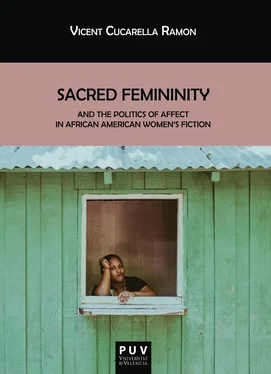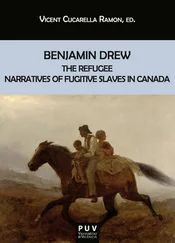In this way, black women dismissed the exclusionary power that the Bible conceded to white culture but also overcame the crippling discourse in which black men hijacked the Bible’s authority as an act of political and cultural resistance intending to create an aspiring black nationalism rooted in religious grounds. Rather, African American women’s reading upheld the Bible as a tool to create a black feminine aesthetic to could retell their vision of life through the Bible as a hermeneutical strategy towards a process of national healing. This process of conjuring is credited upon black women’s spirituality which, ultimately, sustains the mechanism of transformation through a rehabilitated set of narratives that originally read North America as a place of inclusion than connects cultural and spiritual components as “elusive but identifiable” (342) aspects of a same culture, as Toni Morrison argues in “Rootedness: The Ancestor as Foundation”. As Renita J. Weems explains, “the African American woman…must agree to renounce her experience of reality, suspend her understanding of life, and waive her right to her own values, so that she may without encumbrances surrender herself to the experiences, world view, values, and assumptions embedded in the work” (65).
In other words, African American women have historically defied reductive analysis from the Eurocentric and androcentric perspectives of those, inside and outside the black community, who have manipulated religion as a cultural token only to impose a specific (patriarchal) ideology. African American women have therein counteracted a doctrinal way of reading and interpret religion conceiving a sacred femininity that has been utilized not only to facilitate an ontological shift towards a unique intersection of race-ethnicity, class and gender as a motive force for social change but it has also proved to create a sacred feminist aesthetics that, in Julia Kristeva’s words, links “the feminine, the sacred, and the various fates of Africanness” (21).
By conjuring up a feminist interpretation of the sacredness of the biblical musings, black women have made benefit from their role in religious and cultural participation within the community to find their way as spiritual guides. However, contrary to the individuality that conformed the religious strategies used by black men to emerge as leaders, African American women confided in the affective bonds that united the whole community to avoid confrontation and, at the same time, to create a web of solidarity that eventually turned their sacred vision of religion as a healing tenet for black Americans. That is to say, “the emotional, psychological, and religious health of African American women has been directly related to their refusal to hear the Bible uncritically and their insistence upon applying what one might call an ‘aural hermeneutic’” (Weems 66).
According to Judylyn S. Ryan, spirituality, as depicted in African American women’s literature is recognizably African/Black but rarely conforms to any single traditional African religion. Instead, its contours are shaped by the core ethical and philosophical values around which several traditions cohere within the African cultural domain. Black women artists depict this African-centered spirituality in varying configurations along a syncretistic range (23).
Thus, through this ‘aural hermeneutic’, which stands as the starting point of black women’s aesthetics of the sacred femininity and despite an unwarranted disregard of an autonomous endeavor on the part of black culture to unweld black literature from the taxonomy race/culture, African American women signified upon spirituality as an epistemological means which assists cultural objectives that “withstand various ideological assaults and develop their own liberating ideologies” (23), according to Judilyn S. Ryan. Certainly, black women’s narrative engagement with spiritual agency propelled Afro-Christianity as an asset that could “collectively perpetuate community-culture and…an ideology of freedom” (Ryan 33) for Christianity was used as a vehicle for their own empowerment. In short, parallel to the family tradition that black women propelled as a network that could enable African Americans to cope and to survive, they also built a religious tradition both to blot out the effects of racism and sexism but also to legitimize a black feminine aesthetic that could single out their own experience.
In their attempt to get over the isolation and tokenism within the black community, or the “deformed equality” to borrow from Angela Davis, a feminist reading of the sacredness of Afro-Christianity became black women’s cultural ally to insist that they were also “persons for whom Christ died”. Indeed, as Townsend Gilkes contends, “‘Afro-Christian’ recognizes that our African ancestors constructed a complex and dynamic tradition not only from the materials provided by the missionaries and other Europeans confronted in the nighttime of slavery, but also from the cultural imaginations of their African backgrounds, in which women were essential to cultural and religious practice” (126). Re-reading the Bible through an Africa-centered spirituality has, Ryan reminds us, “an important epistemological function” (24). Blackening the Bible to serve a spiritual and feminist reading that can voice black women’s cultural concern is minted by Toni Morrison as a work of ‘literary archaeology’ through which, alongside the ensuing affective turn, African American women “characteristically acknowledge the interconnectedness of aspects of self/being” (Ryan 25). This link will be explored in the new section to contextualize my further analysis of the three proposed novels.
The Politics of Affect and the Sacred Black Female Self
God is unlike religion, which corrupts that process with its own power structure. And finally, God is not a woman.
Michèle Roberts
African American culture is patterned to a large extent by a unique sense of spirituality and religion. Yet, despite the communal efforts of black women since slavery times to create a model of unity and wholeness among women, the linkage between spirituality and affect has been overlooked. In this chapter Iintend to bring together the three proposed African American women writers’ undertaking to weave a feminine spirituality with affect based on the aesthetics principles of the African American culture. Since, as Silvia Pilar Castro-Borrego points out, “African American cultural modes of being seek constantly a basic harmony of connectedness” (3), Crafts, Hurston and Morrison establish spirituality and sacredness vis-à-vis affect to propose a concept of unity that consents to rehabilitate the black female self. Although spirituality and affect seem to evolve concurrently in Crafts’s and Hurston’s novels, Toni Morrison’s fiction privileges affective bonds and unity before religious modes of representation. The outcome is that any glimpse of bigotry—whether it is spiritual, political or both— winds up breaking away with affect and a sense of union, making the act of wholeness a hopeless endeavor.
Jeannette King points out that if “(w)oman, like history, has been a text to be written and interpreted by man” (29), women also had the opportunity to reframe social reality and invent a new language to define themselves and shape their definition in their own words. This is so because “language itself… offers an arena in which such definitions may be challenged” (King 29). Growing apart from the patriarchal vision of society and religion women reinterpreted the biblical scriptures to go against the radicalism of the Christian message. As Frances Devlin-Glass Lyn McCredden asseverate, for women, their relationships to the institutions and traditions of religious faith are constructed on shifting ground. While some place themselves “outside” the institution, and often outside any orthodox understandings of their faith, others identify themselves to varying degrees as “inside”. This metaphor—inside/outside—may be used as a means of self-definition that begins from a critical, discriminating acknowledgment of the power of religion and its institutions (3). Thus, women engaged in the ‘destructive genesis’ (Kristeva) of the Bible to walk the path of the Bakhtinian carnival theory, that is to say, to breed a “spontaneous, irreverent, bawdy and counter-authoritative” (King 31) reading of the spiritual message.
Читать дальше












